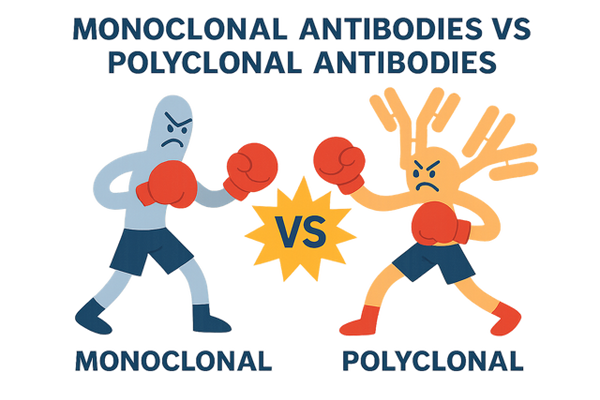Monoclonal antibodies VS polyclonal antibodies - Which to choose?
Posted by S.Davis on 27th Jun 2025
Monoclonal antibodies VS polyclonal antibodies - Which to choose?
If you’re reading this then hopefully you have an interest in antibodies or you are contemplating which of the two types you ought to use within your research.
To begin, let’s cover a few basics.
Monoclonal antibodies – these singular types of antibody are produced by harvesting purified cell lines derived from a single B cell within the immunity, allowing them to bind to one unique epitope region of an antigen.
On the other hand, polyclonal antibodies describe a collection of antibodies which are grown from different B cells. This makes them capable of recognising multiple epitopes on the same antigen.

Antibodies are used in research to detect target proteins in procedures like western blotting, immunofluorescence, and immunohistochemical analysis. These antibodies are most commonly either monoclonal or polyclonal, although other types exist.
Both types of antibodies are typically created by injecting an antigen—often a protein or peptide—into an animal. The immune system responds by producing antibodies specifically targeted against that antigen.
When deciding between a monoclonal or polyclonal antibody, it's important to consider the conditions and aims of your experiment. Below we outline the key differences, advantages, and disadvantages of each type, and when to use which.
Comparison Table
| Criteria | Monoclonal | Polyclonal |
|---|---|---|
| Specificity | Single epitope | Multiple epitopes |
| Reproducibility | High | Variable |
| Production Time | Longer (~6 months) | Faster (~2-4 months) |
| Cost | Higher | Lower |
| Application Suitability | Diagnostics, ELISA, therapeutics | IHC, IF, Western blot |
| Response to Denatured Targets | Poor | Better |
Monoclonal Antibodies
Advantages
- Can produce large quantities of identical antibodies
- Batch-to-batch homogeneity
- High specificity reduces cross-reactivity
- Better results in protein quantification assays
- Efficient in affinity purification
Disadvantages
- More expensive and time-consuming to produce
- Requires stable storage and careful handling
- Less effective for detecting denatured proteins
- Susceptible to pH and buffer condition changes
- Binding may change with labeling
Polyclonal Antibodies
Advantages
- Cost-effective and quicker to produce
- Ready to use within four months
- Stable and tolerant to buffer variations
- High affinity through multi-epitope binding
Disadvantages
- Batch variability between animals
- Higher potential for cross-reactivity
- May require affinity purification
When to Use Which?
Choose monoclonal antibodies for high-specificity applications, reproducibility, or therapeutic development. Choose polyclonal antibodies for robust detection of low-abundance or denatured proteins, or when speed and cost are key concerns.
Emerging Alternative: Recombinant Antibodies
Recombinant antibodies, created using cloned antibody genes in vitro, offer consistency, no animal use, and engineering flexibility. These are especially valuable in therapeutic applications and high-throughput screenings.
Decision Flowchart
- Low cost, fast turnaround: Polyclonal
- High specificity & reproducibility: Monoclonal or Recombinant
- Target is variable/denatured: Polyclonal
- Diagnostic/therapeutic development: Monoclonal or Recombinant
In conclusion, selecting the right antibody depends on your experimental goals, timeline, and budget. Each antibody type has its advantages—understanding them helps ensure accurate, reproducible results.

